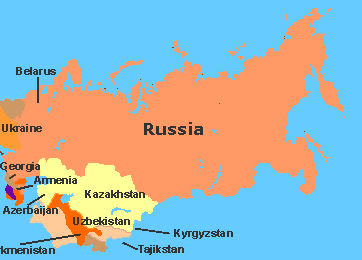Russia sets forth new proposals to boost military cooperation
The final dismantling of military cooperation programs in the framework of CIS is imminent

A two-day meeting of the Intergovernmental Council of the Eurasian Economic Commonwealth went under way in Moscow. The organization consists of Belarus, Kazakhstan, Kyrgyzstan, Russia, and Tajikistan. The presidents of the above states will discuss a lot of issues related to the so-called integration cooperation. Organizations of sub-regional cooperation are now playing a much bigger role following the final transformation of the CIS into a “instrument of civilized divorce” due to the wave of “multicolored” revolutions that swept across the former Soviet Union in the last few months. The governments of the above states pay close attention to the efforts of the presidents of Georgia, Ukraine, Moldavia aiming to revive the pro-Western alliance GUUAM. 
Searching for an “adequate” political response would be not enough for Russia under the circumstances. Russia also has to do an urgent stocktaking of principal ways of military cooperation with its nearest neighbors. The Eurasian Economic Commonwealth as an economic union seems to have good prospects. In the meantime, Collective Security Treaty Organization could become a military an political union within the same framework.
The presidents will probably try to achieve a “breakthrough” in terms of integration during the next two days in Moscow. At the very least, they will try to meet the deadline set by “Priority development directions of the Eurasian Economic Commonwealth for 2003 –2006 and the future.” The document provides for a customs union formation to be completed by the end of this year. However, members of the future union are mostly WTO-oriented and therefore the formation process is likely to take longer than expected. Now the members of the organization are squabbling over more simple issues. For example, they are still arguing who will be in charge of common funds distribution regarding financing of joint programs. The amount of money at issue is not so big but still it is a matter of principle. Russia and Belarus share the opinion on the issue (chairman of the organization should be in charge of funds distribution). On the other hand, Kazakhstan and Tajikistan believe that money should be handled by a inter-regional bank.
The final dismantling of military cooperation programs in the framework of CIS is imminent. Meanwhile, the role of the Collective Security Treaty Organization (CSTO) will continue to grow on. Speaking to Izvestia a few days ago, CSTO Secretary General Nikolai Boduyzha said that “the majority of 'military' initiatives put forth within the CIS framework have been never signed or ratified by all the member states.” According to him, some CIS states already committed themselves to joining NATO. Those states are switching into armed forces structure and armaments in compliance with NATO standards. Mr. Borduyzha believes that cooperation and integration issues are out of the question under the circumstances. On the contrary, the members of the Collective Security Treaty Organization still stick to Russian standards in terms of armed forces structure and armaments. The collective armed forces conduct annual exercises code-named Rubezh (Frontline) to test their fighting efficiency.
In the light of the above, steps aiming to strengthen air defense network of the CSTO countries look perfectly natural. According to Mr. Borduyzha, the network will be under central command while operations with regard to a similar network in the CIS are merely coordinated by common efforts. Besides, the air defense network of the CSTO countries should include common air space of the respective countries. In other words, air defense forces of a member state of the organization will be soon capable of operating within the limits of the common air space. Tomorrow Russia will take over presidency of the CSTO countries from Kazakhstan. It means that Russian political and military leadership will be calling the tune for one year before passing the baton to another member state. Russian Defense Minister Igor Ivanov will be in charge of military authorities of the CSTO while the Head of the Russian General Staff Yuri Baluevski will assume the office of the Joint Chiefs of Staff of the Collective Security Treaty Organization.
Subscribe to Pravda.Ru Telegram channel, Facebook, RSS!


